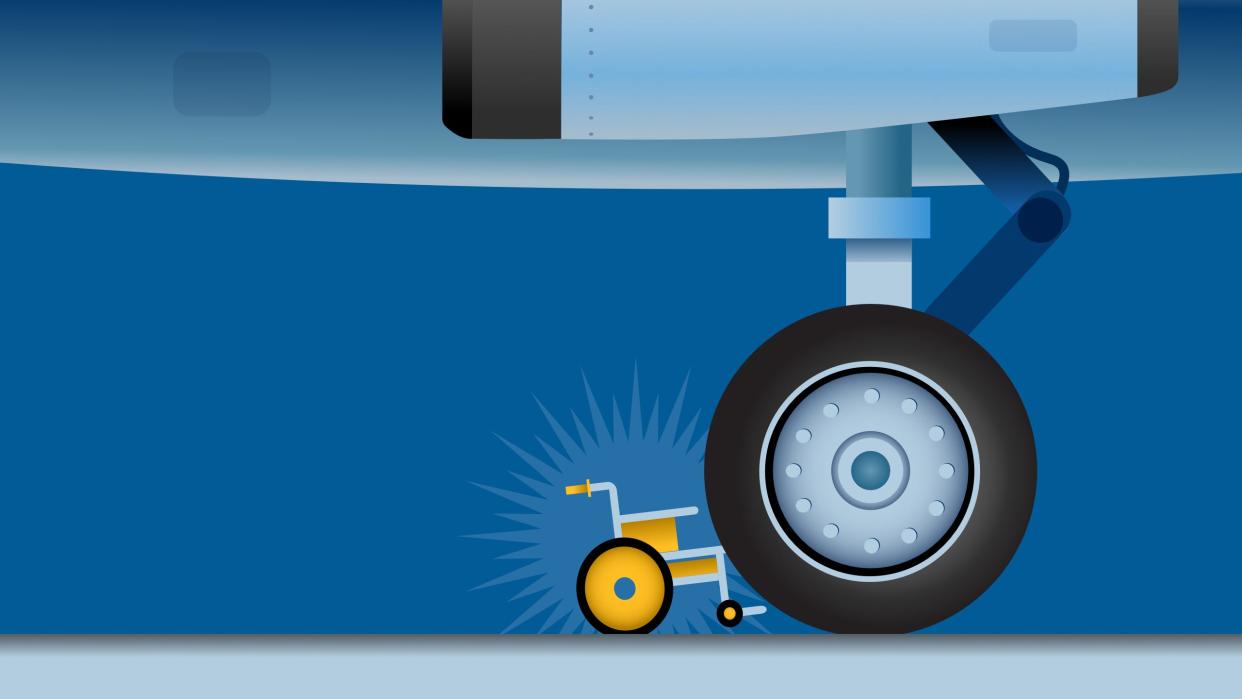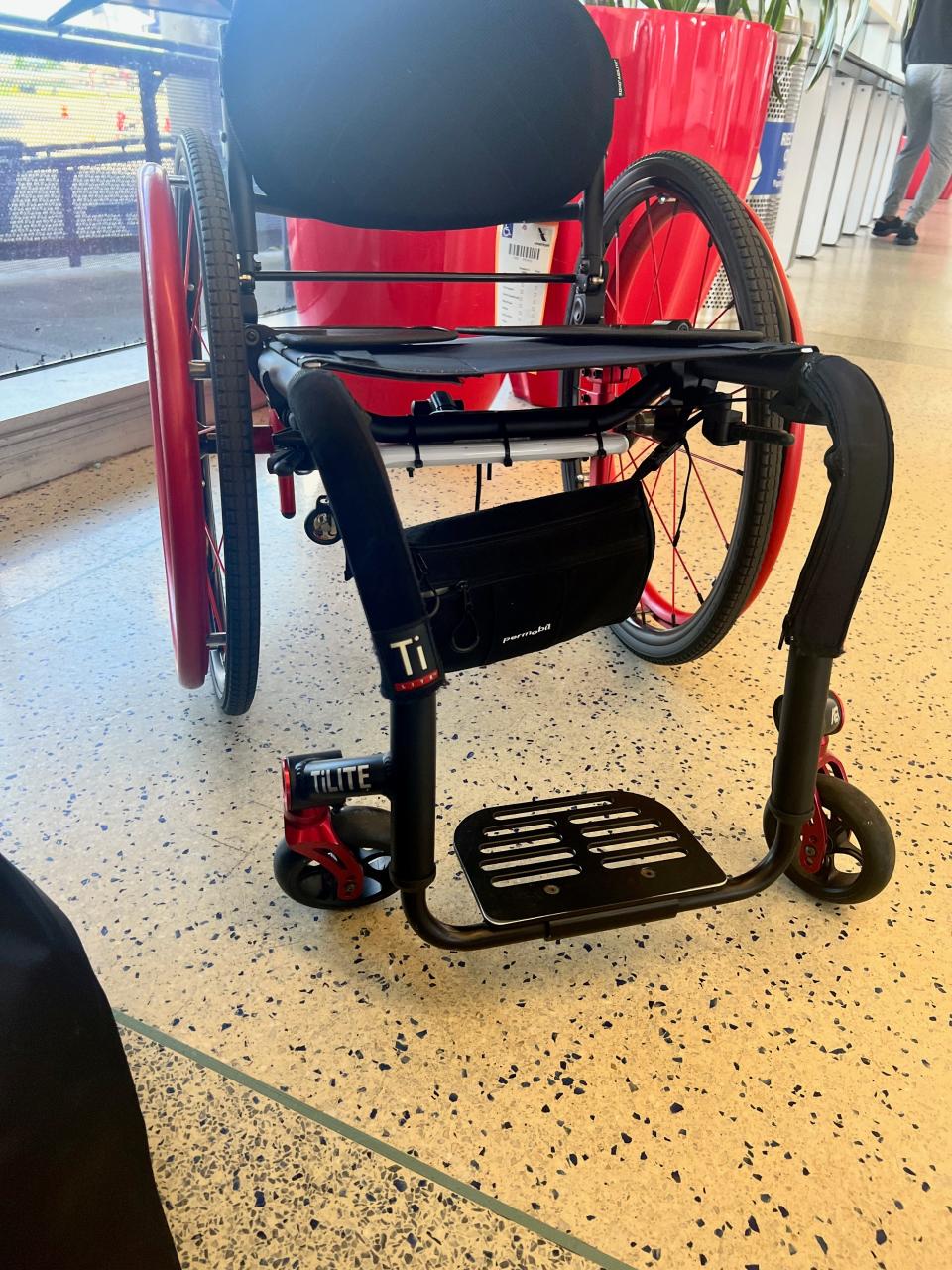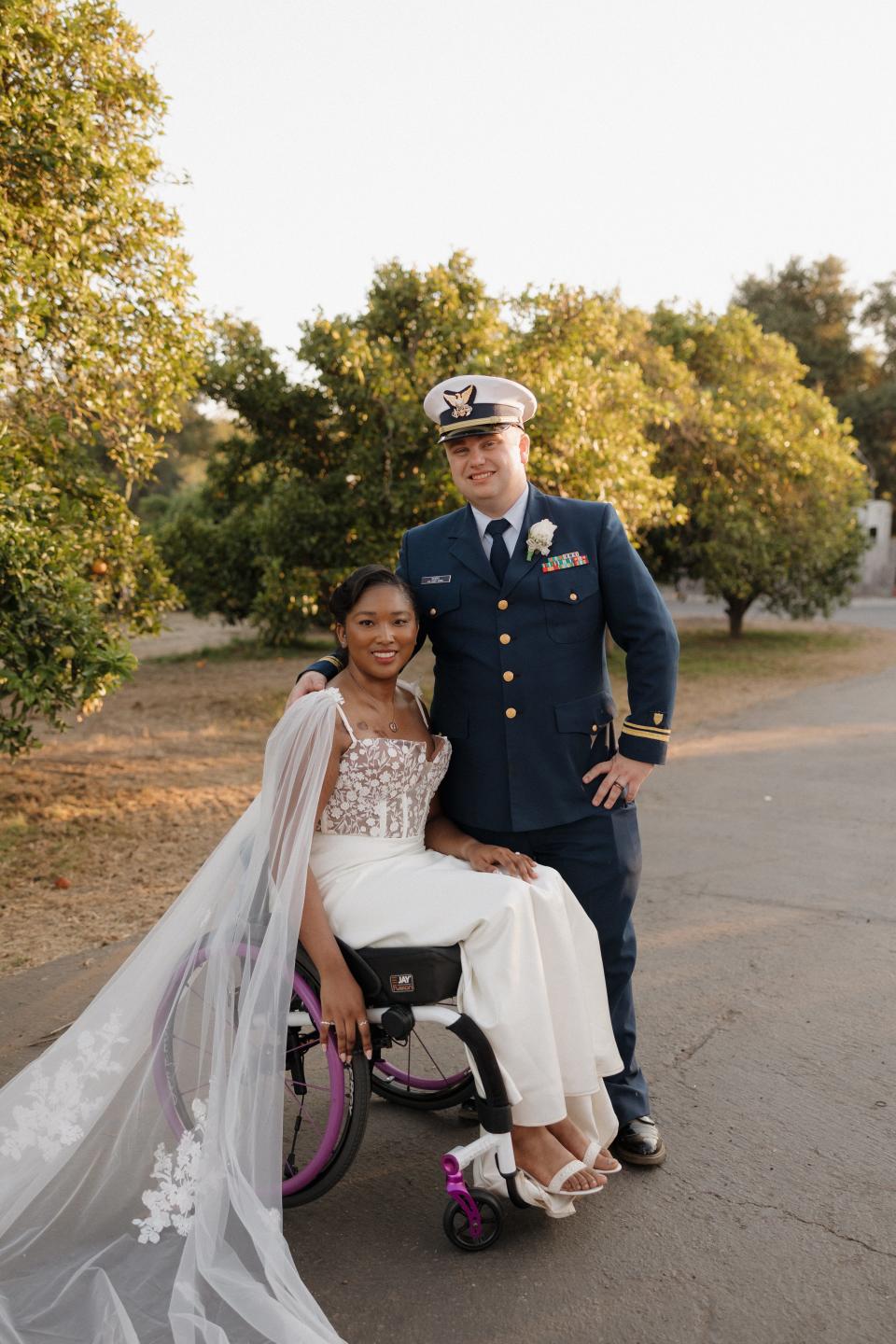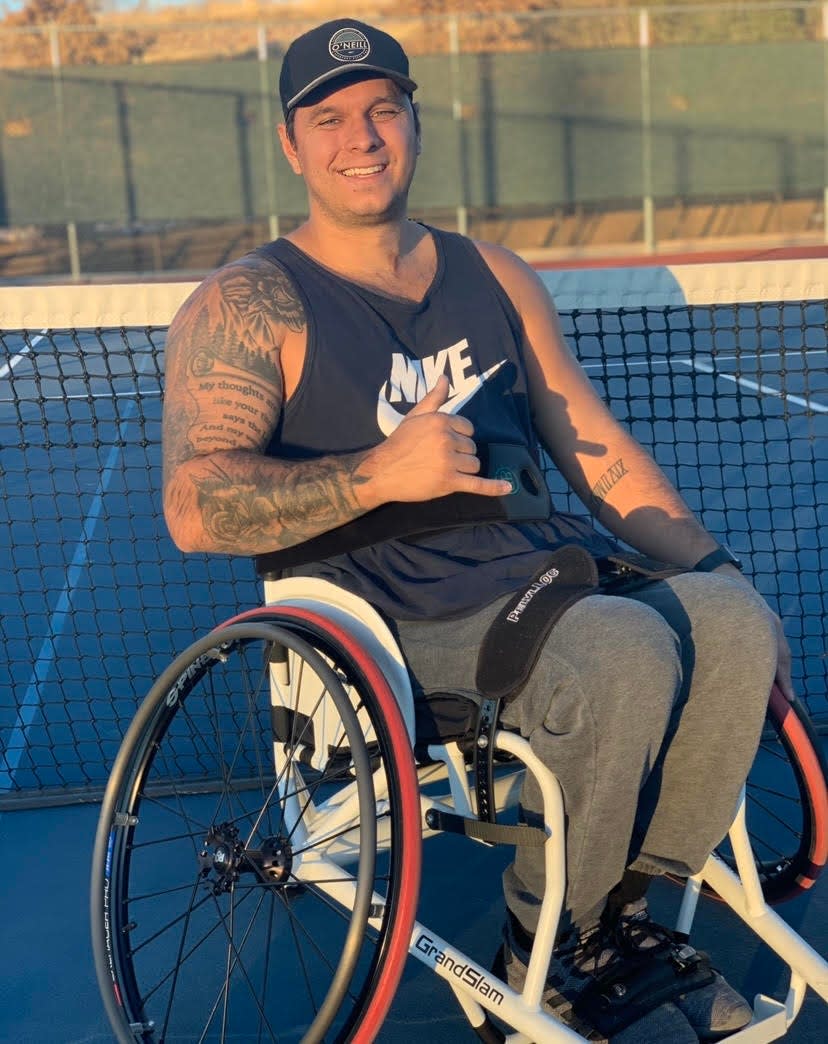Airlines damaged thousands of mobility aids this year: Here's how 30+ flyers were affected

“I fully expect my wheelchair to keep getting damaged, and it’s a fairly significant source of stress for me when I fly,” Heather Bennett told USA TODAY. Bennett is one of thousands of wheelchair users whose devices were damaged while flying in 2023 and one of more than 30 disabled travelers who shared their personal stories of such damage with USA TODAY this year.
According to the Department of Transportation, there were 8,637 reported mobility device damage incidents as of September, about 1.4% of the total number transported. Full-year data for 2023 is expected in early 2024. For comparison, by the end of September 2022, airlines had reported 8,348 incidents of mobility device damage to the DOT. While the numbers for 2023 are slightly higher so far, airlines also carried almost 75,000 more mobility devices in 2023 compared to the previous year.
Even so, Transportation Secretary Pete Buttigieg told USA TODAY those numbers need to be brought way down.
“Any number greater than zero is not an acceptable number,” he said. “This not only affects your trip, it affects your life.”
Bennett agreed, saying not a lot of people realize, “it’s not just the damage to the chair, it’s the time in my life that I have to take to fix it that ended up being costly.”
Buttigieg and accessibility advocates want airlines to do better and are optimistic about regulatory changes being considered for 2024 that could help bring some improvement.
Here's what we learned throughout 2023 and what may be in the hopper for the new year and beyond:
What travelers told us in 2023
Nearly everyone who shared their story with USA TODAY at some point said some version of the phrase “breaking my wheelchair is like breaking my legs.”
Every traveler shared frustrations that airline employees seemed largely unconcerned with how to handle mobility devices, adding that airlines needed to boost employee training.

Stephanie Groce, whose wheelchair was destroyed on an American Airlines flight just days before her wedding in July, confirmed to USA TODAY it still hasn’t been fixed.
“I’m hoping for a Christmas miracle, that it gets fixed by the end of the year. That would be really nice, but we’re kind of running out of days,” she said. “Even with an expedited case, we’re going on five months and counting in order to get me made whole and to get that wheelchair repaired.”

Andrew Bogdanov, a professional tennis player whose wheelchair was damaged multiple times in transit to tournaments, said he’s happy it was replaced fairly quickly but added that wheelchair damage and other problems with accessibility are far too common in air travel.
“It’s inconsistent with travel, and that’s a completely different issue than with my equipment and them taking care of that,” he said. From airport to airport or even flight to flight, disabled travelers are never sure what to expect and if their medically necessary equipment will arrive in working condition. Bogdanov said a set of national standards for handling mobility equipment could help travelers and aviation employees alike be better prepared for every trip.

Alan T. Brown, director of new partner engagement at the Christopher and Dana Reeve Foundation, said his wheelchair was damaged on two recent trips and agreed that better training is key to improving accessibility in air travel.
“These guys that are handling luggage, they just want to get the plane out of there moving, they don’t really care,” he said. “There’s got to be somebody that can go down there to show them how to do it, and if you’re not sure, ask.”
When Brown, who is a quadriplegic and has been using a wheelchair for 36 years, spoke to USA TODAY, he was waiting for a technician to come to evaluate his power for repair or replacement.
“It’s the mental aggravation of the whole thing. I travel for work. I know I have to get on planes again. You’re already thinking about the future,” he said. “I should be able to hop on a plane any time I want.”
Changes that airlines and regulators introduced in 2023
Buttigieg said he’s excited about projects around the country aimed at improving accessibility in airport terminals and is optimistic about regulatory updates that were introduced this year.
“The existing protection and enforcement around damage to wheelchairs isn’t up to the magnitude of the problem,” he said. “We’ve launched the rulemaking to start ensuring safe accommodations for air travelers using wheelchairs that haven’t happened before.”
Buttigieg also pointed out that a new rule was finalized that will eventually require accessible lavatories on most planes.
“It will take a while to implement, but it will be worth it,” he said.
Many airlines also announced improvements to accessibility in 2023, including Southwest announcing a Customer Accessibility Advisory Committee in October, joining other airlines that already had such bodies established.
United Airlines announced it would install Braille placards on its aircraft and publish cargo hold door dimensions for all its planes online.
“Both independently and through our recent collaboration with the Department of Transportation, we are developing and delivering innovative solutions that improve accessibility and address some of the travel challenges encountered by customers who use wheelchairs,” United spokesperson Charles Hobart said in a statement to USA TODAY. “Embedding accessibility into every decision will propel us forward and is the right thing to do.”
American Airlines also announced several accessibility improvements this year, including a special wheelchair/scooter bag tag to help improve mobility device tracking through its system and alert ground crews to the specific handling needs of each device.
“We’ve placed a particular focus on giving our team members the tools and resources they need to properly handle and track customers’ mobility aids,” American Airlines spokesperson Amy Lawrence said in a statement. “We recognize how important it is to support the independence of customers with disabilities as they travel and will continue to work hard to ensure a smooth experience for all of our customers.”
Delta Flight Products, a wholly-owned subsidiary of Delta Air Lines, demonstrated a concept for in-cabin securement for power chairs, which many advocates praised throughout the year. Although Delta has fully funded the project and continues to support Delta Flight Products as it seeks regulatory approval by the FAA, the company has not yet committed to putting the seats on board if they’re approved.
“While we have long engaged in a variety of initiatives to increase air travel accessibility for customers with disabilities, our work in this important space is always evolving. We will continue to invest in technology and innovation to support our customers with disabilities, and will keep a keen eye on the progress of this first-of-its-kind airplane seat,” a Delta spokesperson told USA TODAY in a statement.
Michele Erwin, founder and president of All Wheels Up, an advocacy group that focuses on in-cabin wheelchair securement, said it was exciting to see the concept receive so much attention. Nevertheless, she warned it’s going to take a long time before it’s available to travelers because the Federal Aviation Administration still has to approve the space product, as well as whatever securement mechanism is ultimately used with it.
“It’s a very, very complex conversation,” Erwin said. “It’s not happening in two years.”
What disabled travelers can expect in 2024
Major structural improvements to accessibility on airplanes are unlikely in the new year, but that doesn’t mean nothing is happening.
Buttigieg emphasized that new regulations are being considered, including a private right to action, which would allow disabled travelers to sue airlines that damage their devices for the first time.
“I think airlines would do a much better job and be more diligent if they faced a different economic incentive,” he said.
Erwin also noted that a lot is going on behind the scenes to help move accessibility in air travel along.
“I believe that the industry is putting their money where their mouth is. Entire departments are being created internally at some of these organizations to work on accessibility,” she said. “While it’s slow…the good news is work is being done and traction is starting to happen.”
What advocates hope to see in the future
For most advocates, the key first step to improvement is better training for airline employees who handle mobility devices and interact with disabled passengers. Here’s some of what different organizations are pushing for as we head into 2024:
Better training and onboard accessibility
“The people that are handling our bodies and our lives are people that don’t know how to do it … If you don’t strap us the way you’re supposed to strap us, if you don’t carry us the way you’re supposed to carry us, we can fall.” – Vincenzo Piscopo, president of the United Spinal Association
“Going to the bathroom is just a basic human right,” Piscopo added. “The fact that that has not been a priority for the airline industry is the biggest example of ableism in the airline industry.”
“For us, what that looks like is that people who are going to be assisting you, prior to them stepping out to do the work, under the pressures of time to load an aircraft, that they receive training from someone who is familiar with how the aisle chair works, that they have some understanding of the needs of passengers with disabilities who need to use an aisle chair … This should happen in an environment where people can be trained and learn in a way that’s safe.” – Heather Ansley, chief policy officer at Paralyzed Veterans of America
Less focus on the financial barriers and more on disabled dignity
“We focus way too much on the cost and the difficulty of making these changes … We need to really underscore the (positive) financial and economic impact that accessible business and leisure travel would mean.” – Kendra Davenport, president of Easterseals
The advocates are all optimistic that the FAA reauthorization bill will be passed by Congress in the new year, and both the House and Senate versions of the bill contain sections that aim to make air travel more accessible.
Timeline of incidents we reported on in 2023
Zach Wichter is a travel reporter for USA TODAY based in New York. You can reach him at [email protected]
This article originally appeared on USA TODAY: Travelers, advocates say airlines can do better for disabled flyers
